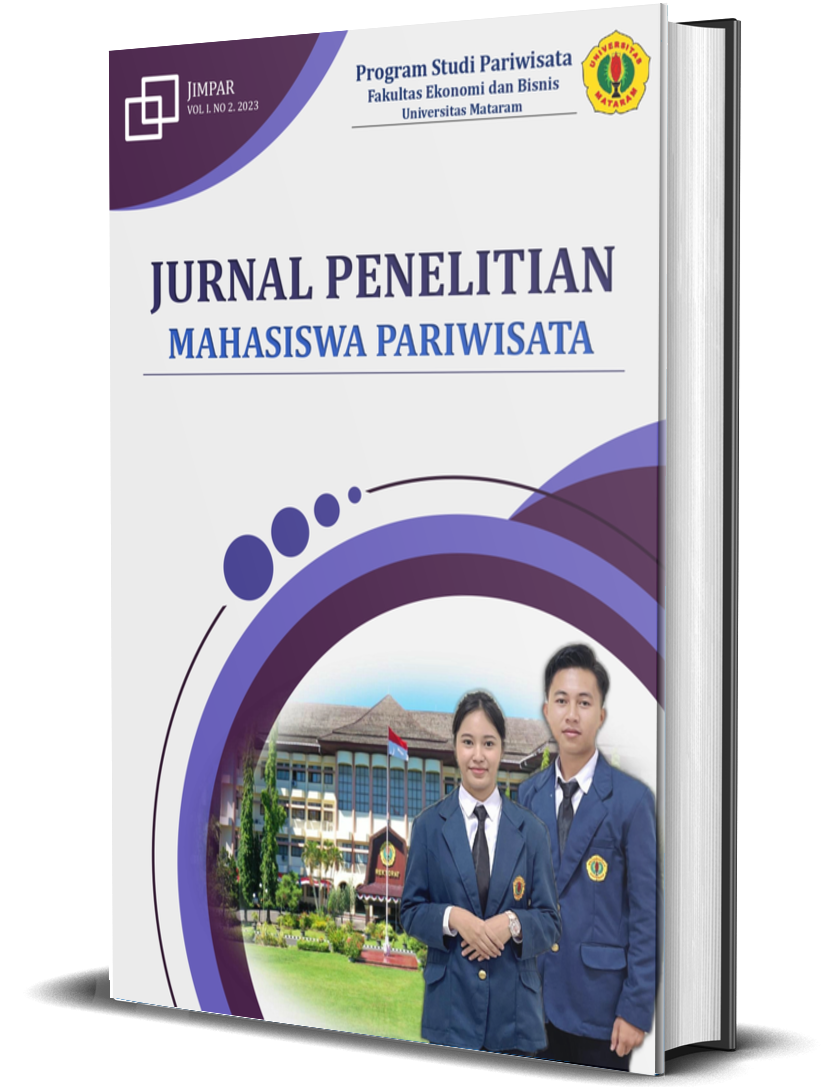Analysis of The Influence of The Existence of Tanjung Beach Culinary Tourism Bias on The Economy of The Surrounding Community
Keywords:
tourism economy, tourism development, community-based tourismAbstract
Tourism is a significant economic activity that serves as a crucial source of revenue for various regions, including West Lombok Regency. This particular area boasts several tourist attractions, such as Tanjung Bias Beach, which have the potential to contribute to the economic development of the local community through the tourism sector. The purpose of this study was to assess the economic effects of Tanjung Bias Beach culinary tourism on the local population. The employed research methodology is qualitative descriptive in nature. Data analysis techniques encompass many methods such as data reduction, data display, and drawing conclusions. The findings of the research indicate that culinary tourism at Tanjung Bias Beach plays a significant role in bolstering the economic well-being of the local population. The influx of visitors to Tanjung Bias Beach leads to the generation of monetary transactions, hence fostering employment opportunities and augmenting the income of the local community responsible for its management. It is advisable for both the general public and the government to enhance the promotion of gastronomic attractions at Tanjung Bias Beach in order to foster its sustained growth.
References
AULA, M. Z. (2020). Khayangan Agro Tourism Village Development Strategy in Improving the Economy of Mulyosari Village Community.
Cohen, E. (1984). Toward a Sociology of International Tourism.
Hadiyatno, D., Indriastuty, N., &; Janah, U. (2018). Development of local tourism on the coast of Manggar Balikpapan City to improve the economy of the surrounding community.
Hermawan, H. (2016). The impact of the development of Nglanggeran Tourism Village on the economy of the local community. Journal of Tourism.
Hidyat. (2015). TOURISM DEVELOPMENT AND ECONOMIC GROWTH NEXUS.
Kurniawan, R. E., Makrifatullah, N. A., Rosar, N., Triana, Y., &; Key, K. (2022). Humantech Indonesian Multi-disciplinary Scientific Journal.
Moleong, L. J. (2016). Qualitative Research Methodology. PT. Juvenile Rosdakarva.
Navosa, N. (1984). THE IMPACT OF TOURISM ON A VILLAGE COMMUNITY : A CASE STUDY OF VOTUA VILLAGE.
Oktiana, P. (2020). THE IMPACT OF SUKARARA TOURISM VILLAGE DEVELOPMENT ON THE ECONOMY OF LOCAL COMMUNITIES (Study in Sukarara Village, Jonggat District, Central Lombok Regency).
Ompusunggu, V. M., &; Munthe, R. G. (2020). Analysis of the Impact of Tourism on the Community Economy (Case Study of Tongging Village, Brand District, Karo Regency, North Sumatra).
Pitana, I. G., &; Diarta, I. K. S. (2009). Introduction to Tourism Science. Yogyakarta.
Sari, N., Novia, S., I, Gai, A. M., & T. (2018). THE IMPACT OF TOURISM ON THE ECONOMY OF THE COMMUNITY IN TULUNGREJO VILLAGE, BUMIAJI DISTRICT – BATU CITY.
Shoimah, S., Faculty, N., University, E., &; Darul, I. (2022). NGIMBANG LAMONGAN REGENCY.
Solanke, R. B. (2019). IMPACT OF TOURISM DEVELOPMENT ON LOCAL COMMUNITY : A CASE STUDY OF AJANTA WORLD HERITAGE SITE.
Sugiyono. (2018). Mixed Methods.
Wardhana, A., Kharisma, B., &; G.H, M. S. (2019). The impact of the tourism sector on economic growth.
Zhao, J., &; Min Li, S. (2018). The Impact of Tourism Development on the Environment in China.








